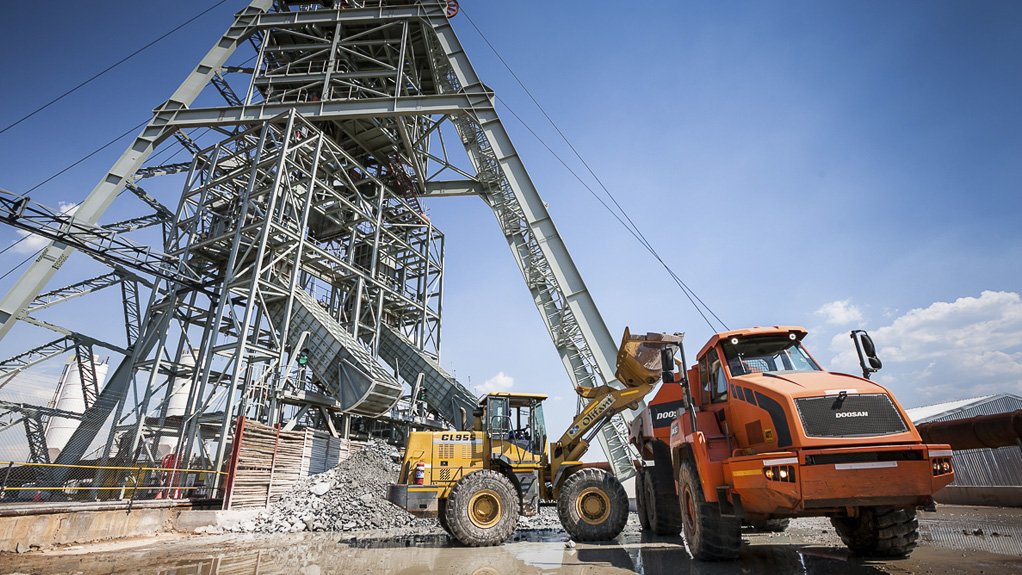Platinum producer Ivanplats, a subsidiary of Canadian mining company Ivanhoe Mines, is focusing on bringing its Tier 1 Platreef project, in Limpopo, into production in 2022, says Ivanplats VP and projects executive head Gerick Mouton.
The mine will produce platinum, palladium, rhodium, nickel, copper and gold concentrate.
“Our primary objective is to reach steady-state production of four-million tons a year in Phase 1, at which point we will assess when to ramp up to six-million tons a year and then to eight-million tons a year in Phase 2.”
Mouton highlights that Shaft 1 at the project has reached a depth of 750 m, about 30 m above the Flatreef mineralised zone, with lateral development of the 750 m station currently under way.
“This means we are more than 75% of the way down to the planned final depth of 980 m. The 750 m station on Shaft 1 will provide initial, underground access to the high-grade orebody, allowing for mine development to proceed during the construction of Shaft 2, which will become the mine’s main production shaft.”
Meanwhile, Ivanplats has started with the early works for Shaft 2 – a 10-m-diameter main production shaft, which will have the capacity to hoist six-million tons a year.
“We are making good progress with the early works, which entails the boxcut and hitch foundation. Engineering and mining contractor Murray & Roberts Cementation has completed the headgear design, and surface infrastructure will start soon.”
Mouton attributes the company’s progress to the support of its stakeholders, such as the host communities, as well as its broad-based black economic-empower- ment ownership model and social and labour plan.
Mechanisation
Mouton explains that the Platreef project is significantly different to most other platinum group metals (PGMs) mines, where labour is intensive because the orebody is narrow (typically 1 m or less), which is characteristic of the Merensky reef, in the western limb of the Bushveld Complex.
“The orebody dictates the mining method used. In our case, at Platreef, we have a flat, thick orebody which averages 19 m in height. Given the size of the orebody, mechanised mining is the primary option, to not only reduce labour costs but also ramp-up and produce at record production rates.”
He says Ivanplats will use long-hole stoping, with maximum stope sizes of 60 m × 15 m × 19 m, as well as 50 t dump trucks and 17 t load-haul-dump trucks.
PGMs Market
Mouton believes that the future of PGMs mining in South Africa will be along the eastern and northern limbs of the Bushveld Complex, where thicker orebodies allow for mechanised mining, directly impacting on and reducing cash costs.
He says South Africa is by far the biggest PGMs-producing country in the world, with the most significant reserves; therefore, developments in the sector hold implications for the global outlook.
Amid decreasing commodity prices and escalating costs of mining operations, Mouton says the Platreef project has a platinum–palladium ratio of 1:1, of which palladium has been performing well, as well as excellent copper and nickel recovery rates, which assist with the project’s overall predicted cash cost per ounce.
“We believe that most high-cost and unprofitable PGMs mines will, over the short to medium term, make way for new-era mechanised mining methods, which have the benefit of low cash costs per ounce.”
Mouton says the company is optimistic about South Africa’s long-term prospects, with the new government’s drive to create an investor-friendly environment, while tackling the socioeconomic challenges of the country.
He notes that, since being at the helm in February, President Cyril Ramaphosa has consistently declared his administration’s determination to attract foreign direct investment and unblock the obstacles which have been hampering economic growth.
“He has also insisted that trans- formation of the economy and society is non-negotiable, particularly given South Africa’s deeply divided past and the inequalities between the haves and the have-nots.”
Mouton says a balance between the needs of business and underprivileged communities should be a priority, and this requires best efforts from all sides to have long-term social and economic sustainability.
He notes that the majority of the high-cost platinum mines will come under significant pressure in coming years, as a result of low prices and declining demand for the commodities, “and we have already seen evidence of that with some of the big producers”.
Mouton says 40% to 50% of the current supply ounces will be lost and, in future, supply will be supplemented by the low-cost mines in the eastern and northern limbs of the Bushveld Complex.
“As long as you can operate on the left-hand side of the cash-cost curve, you will be profitable and guarantee a return on investment,” he concludes.
Edited by: Mia Breytenbach
Creamer Media Deputy Editor: Features
EMAIL THIS ARTICLE SAVE THIS ARTICLE
ARTICLE ENQUIRY
To subscribe email subscriptions@creamermedia.co.za or click here
To advertise email advertising@creamermedia.co.za or click here













